- Home
- Anne McCaffrey
Acorna’s People Page 4
Acorna’s People Read online
Page 4
It appeared that he didn’t. “I see no reason that you should be less than honest,” he said with a frown. “But you must understand how little time there was to prepare. Some of the features of the old home world were not only unnecessary, but were at times dangerous. A flat and fairly uniform planetary surface was most efficient for terraforming under the circumstances. This planet had such a surface. As for the other fauna, while we introduced all the essential species—single-celled life forms, invertebrates, and some of the smaller vertebrates like birds and reptiles—during the course of the terraforming process, we were still in the process of gathering breeding populations of the larger vertebrates to transplant when we were notified that the evacuation of our people was to take place immediately. The Khleevi invasion had overtaken Caabye—”
“That was the third planet from our sun back on Vhiliinyar, Khornya,” Neeva interjected.
“We had no time to waste. Getting our people off the planet and on the way to safety took priority. We had to mobilize our entire fleet—those ships that were not already away from the planet, that is.”
Acorna did not need to invade his thoughts to realize that he was making a posthumous reprimand aimed at her parents because they had taken a spacecraft—and the director of weapons development, which was her father’s title and position—away from Vhiliinyar at such a critical time. Though how her parents could have predicted the moment was at hand so quickly when the speed of the final Khleevi invasion took everybody by surprise, Acorna couldn’t imagine. Nor could she imagine that her parents would have left the planet if they’d had even an inkling of the fate that awaited them. But she wasn’t about to point either of those observations out—if she could help it—to this man.
“In anticipation of the Khleevi invasion, we had furnished this new world with sufficient dwellings, equipment, and provisions to sustain us for the first year. We crowded our people into the colony ships in a mad rush to escape the invaders. We loaded whatever animals we could as well, but the populations were small, and have not flourished here, probably due to a lack of genetic diversity. We have teams searching other worlds now to find similar life forms to supplement and replace the native creatures we lost to the Khleevi.”
“I meant no criticism, sir,” Acorna replied softly. “You were responsible for saving our people and making this new world. No one, least of all me, could possibly find fault with that. I was only thinking of the world I saw in my dreams.”
“Yes, I saw,” he said, and turned on his heel and walked away.
Neeva and Acorna exchanged looks.
(I thought being psychic meant that everyone would understand everyone else,) Acorna whispered to her aunt.
Neeva patted her shoulder and whispered—vocally—in response, “Some people can hear nothing but their own inner voices shouting at them so loudly that they come to believe the shouting is coming from others. The aagroni was a zoologist before he was assigned to the terraforming project. The loss of so many of the native animals was shattering for him.”
Acorna gazed after the man who had disappeared into the throng.
“Never mind him, Khornya,” said Neeva. “The man is a relentless perfectionist. Despite his efforts, like all worlds, this world is less than perfect. Of course, Vhiliinyar was less than perfect, too, but no one remembers that now. So the aagroni does not count the lives he saved or lives of all the children born on this new world when he measures his accomplishments. He is acutely aware, however, of every single complaint about the weather, the lack of animals, the monotonous scenery, the bugs, and natural upheavals that are all too common on a recently terraformed planet.”
Just as Neeva finished speaking a breathless young person skidded up to them, almost falling in her haste to reach them.
“Your pardon, Visedhaanye Neeva,” the young person said. Her skin was a soft mocha brown and her hair a darker brown adorned with large white splotches. She was almost stammering in her haste to convey her message. “The Viizaar Liriili wishes to see you immediately on a matter of some urgency.”
“The Viizaar Liriili?” Neeva asked. “When did Liriili become viizaar?”
“A ghaanye ago, Visedhaanye Neeva,” the girl said. “When Viizaar Tiilye stepped down to pursue Haarha Liirni.”
Acorna consulted the vocabulary she’d learned from the LAANYE, a translation device usually used by Linyaari emissaries to sleep-learn the languages of other species. In her case, a LAANYE had been recalibrated so that she could more rapidly learn Linyaari. A viizaar was some kind of high political office. The other term the girl used seemed to mean “higher learning.” And Acorna knew a ghaanye was roughly a year and a half in Galactic Standard time.
“We were just coming to report in,” Neeva said with extra warmth in her voice to reassure the girl, warmth that was quite at odds with the dismay Acorna felt emanating emotionally from her aunt. “I know Liriili will be so pleased to meet Khornya.”
The messenger girl looked Acorna up and down quickly, even a bit skittishly. “So you’re the one who was captured by the Khleevi,” she said. “How did you get away before getting tortured and killed?”
“Captured by the Khleevi? But I wasn’t captured by the Khleevi,” Acorna said, confused. The two of them fell in behind Neeva and Melireenya as they made their way to the road to the city. Khaari had found old friends among the greeting committee and was, judging from the exchange of lively facial expressions, deep in animated conversation with them. Thariinye, flanked by two younger female Linyaari, followed Acorna and the messenger.
Acorna became aware of a mental exchange between her aunt and Thariinye.
(Thariinye, where do you suppose this child would get the idea that Khornya was captured by Khleevi?) Neeva asked.
(Not from me. I only said that the beings who intercepted Khornya’s pod after her parents’ death were barbaric and in some ways Khleevi-like. I never said she was captured,) the young male replied.
Acorna and the messenger girl looked at each other. Acorna was all too aware of the psychic communication that took place between the mature adults. But according to what Acorna had learned, psychic ability only began manifesting itself in the Linyaari youngsters at puberty. This girl was definitely prepubescent.
“I wasn’t kidnapped by the Khleevi,” Acorna told the young Linyaari. “I was brought up among an alien species called humans. My adopted uncles were very kind, as were many other humans I encountered. I’m sure you would have found Mr. Li in particular most…Linyaari-like. Am I using that correctly? There were other humans who were pretty barbaric, it’s true, but my contact with the harsher aspects of humanity has been limited.”
The girl looked extremely disappointed, and for a moment Acorna thought it might be the sort of blood-thirstiness she knew from the children on Kezdet.
“I’m sorry to have got it wrong,” the girl said. “I didn’t mean to upset you. I was hoping that you had been captured. I mean, not that I wish you ill, but especially when I saw that you looked so unharmed, I was hoping you had been through the torture and survived it because…. Oh well, it’s not important right now. You didn’t endure it, and I’m glad you’re all right. My name is Maati, by the way. I know that you’re Khornya.”
“In your—our language—yes. At home I was called Acorna,” Acorna said, allowing the subject to change since the girl was evidently too flustered by her mistake to make a great deal of sense. Acorna did not find the child easy to read and wondered if this was because Linyaari children lacked psychic ability. It was clear from this youngling that the lack meant that the children not only lacked the ability to receive thoughts but also to transmit them nonverbally, consciously or unconsciously.
“Acorna? That’s an odd name,” Maati said. “So is Khornya, for that matter. I mean, the word means ‘one horn.’ All of us have one horn and nobody has more than one, so what’s the big deal?”
“No one else where I was living had a horn,” Acorna told her.
“Th
ey didn’t? How did they heal things when they got hurt or sick? And what if the water was muddy in the stream where they were, or there was a fire and the air was smoky? How did they fix it?”
“Sometimes they didn’t. If they were hurt or sick, and I wasn’t handy, they went to medics who fixed them with all sorts of tools and tonics and pills. As best they could, anyway. And if the water was muddy, they drank muddy water or went thirsty. If the air was smoky, they breathed it or moved to where there was cleaner air. Again, unless I was handy.”
“I’m surprised they let you come home if they’re that backward and you were that useful to them,” Maati said stoutly.
Acorna sighed and refrained from trying to explain any more about human society.
They were walking across the edge of the field now. The sky was a clear cloudless turquoise. Acorna saw the road from the city to the spaceport just ahead of them. Standing on the road were several men in elaborately decorated uniforms, each uniform a different color. Standing beside them, decked out in beribboned and bejeweled blankets that matched their attendants’ uniforms, were animals that looked something like horses—except that they had horns, just like the Linyaari.
“Madam,” one of the men said, though he said it in Linyaari, of course, “our Ancestors will now convey you to the home of the viizaar.”
“Ride? The Ancestors?” Neeva sounded shocked. “When did we start using the Ancestors as transportation?”
“Ancestors?” Acorna asked, intrigued. She reached out her hand and touched the velvet nose of one of the gorgeously blanketed creatures. Up close, though they mostly looked like Uncle Hafiz’s horses, they also looked a tiny bit like goats, with little beards on their chins. They were somewhat more slightly built than the horses she’d seen in Hafiz’s stables. But they were entirely identifiable as something else she’d been associated with by her human companions all her life. “These are Mr. Li’s ki-lin!” she said. She looked at Neeva. “You didn’t tell me about them.”
“Well, no,” Neeva said. “One doesn’t speak of the Ancestors off the home world, not even among one’s closest companions. They do not care for offworlders, no matter how Linyaari, knowing about them. In the past, they have had great reason to be frightened of other species. Not of Linyaari, of course. The Linyaari have, since the Ancestor’s great tragedy and rescue by the Ancestral Hosts, evolved from them, but their kind are long-lived and adaptable. These are descendents from the original species. Most are far older than any of us. Their species, all of the Ancestors, remain as they always were, unchanged since those long-distant days before our kind had yet to be born.”
To the man in the fuchsia uniform standing beside the fuchsia-blanketed unicorn Neeva now repeated her question. “Ride? The Ancestors?”
Acorna’s normally serene aunt was clearly so taken aback she’d shouted without meaning to.
The fuchsia-clad man rubbed his temples and grimaced in pain. Very slowly, as if he was unaccustomed to speaking aloud, the man said, “Yes, Visedhaanye Neeva. It is the wish of the Ancestors that you and your crew ride upon the backs of these Ancestors to Kubiilikhan. It is traditional.”
“Traditional? Since when? I am not aware that we ever rode upon their backs since—well, since the Linyaari race began.”
The man rubbed the area around his horn, as if continuing to block pain, and said, “It has become traditional over the past ghaanye and a half, Visedhaanye. Since the Ancestors noticed that in the continued absence of flitters, our space-farers have been walking into Kubiilikhan from the spaceport. The Ancestors feel that this lacks dignity. They feel that a lot of two-legged creatures simply walking down the road to the capital provides no sense of circumstance or occasion befitting the importance of our space-farers.”
“Now that is odd,” Melireenya said. “Back on the home world, the Ancestors never quite approved of space-farers. Such dreadful things had happened to them in space, you know.”
“During the evacuation, madam, the Ancestors became aware of the important functions those who brave the perils of space fulfill these days on behalf of our people.”
“I don’t understand,” Acorna said, feeling a little like the girl who had fallen down a rabbit hole in a rather odd old story she had once read while aboard her uncles’ mining ship. “The ki-lin here are our Ancestors, and they want us to ride them because there are no flitters? Why aren’t there any flitters? Isn’t it awfully hard to get around on the planet just walking or maybe riding on—on the Ancestors?”
Aagroni Iirtye, who was in the group of people rounded up by messengers to go to the viizaar’s house, spoke up. He demanded of her as if she were stupid, “How much room do you think a space fleet has when it has one chance only to evacuate an entire planet full of people and the essentials for helping them survive? Flitters are large. They take up vital room that is better used by other cargo. They are easily replaceable. Organic creatures are not.”
Acorna couldn’t help herself. She had to reply to that. “Of course the living must come first, sir. But wasn’t it difficult to settle the planet without some sort of small scale ground transport?”
“We had steps, ramps, and ladders…and we had feet, young lady!” the scientist said. “And each transport ship had a shuttle fleet which was perfectly adequate for transporting people and supplies to various locations around the planet as necessary. Our current dwellings and devices are quite sensibly easily portable, and as a people we’ve always kept the complex machinery we require in our home environment to a minimum. Flitters were, during the chaos of the evacuation, simply a convenience that took up room we needed to transport the Ancestors to our new home. The Ancestors, after all, are sentient beings. They could hardly be left to the nonexistent mercies of the Khleevi.”
He shook his head at the general stupidity of his fellow beings and allowed an attendant to lead him to his designated Ancestor.
“And afterwards,” someone said in a small voice, “even though the council did get around to ordering flitters eventually, they’ve been on back-order for almost an entire ghaanye.”
“I don’t quite understand,” Acorna said. “You mean it’s been three years and you haven’t even started replacing them?”
“It’s all right, dear,” Neeva told her. “You need not understand everything right away. There will be plenty of time to explain later.”
“I’m just surprised that…never mind. Since the Ancestors wish to make such a sacrifice, please tell them I am deeply appreciative,” Acorna said, dipping her own horn toward the unicorn. She turned back to Neeva and whispered to her in a quiet aside, “It was just a surprise that the Linyaari have no more mundane form of ground transport when they have such a glorious space fleet.” She indicated the ships neatly docked nearby, so many fanciful eggs in a crate.
“The ships were necessarily brought along during the evacuation. We used everything flyable in our haste to leave our old home before the Khleevi came. The flitters were expendable, though, as were many of the technological devices we’d commonly used back on the old planet. We concentrated on saving the biological wealth of the home world. As is always the case in any forced migration, there were things we lost along the way,” Neeva said.
“We have all we need to sustain us,” the attendant replied, overhearing the quiet conversation. “The Ancestors in their wisdom indicate the path of truth, as usual. By their example, they show us how to use what is important to substitute for that which is less so.”
“It takes time and credits to resupply a transplanted world,” Melireenya said, as, after a deep bow to the unicorn blanketed in blue, she was helped by the creature’s attendant to mount. “Fortunately, our space fleet was equal to the demands that we made of it, both during the evacuation and now. Good engineering and buying quality paid off when we were in dire circumstances.”
“The ships weren’t manufactured on your old home world?” Acorna asked, surprised.
“Only partially. They were assembled off-plan
et by manufacturers who cater to our trade and then brought to us to be customized to our specific needs and tastes by Linyaari techno-artisans.”
“I see. But why off-planet? I thought, with the LAANYE and the other devices I’ve seen, that you—we—were a highly advanced technological society with the infrastructure to support a great deal of industry.”
“Having the capability isn’t the point, child,” said another of the Linyaari greeting committee.
The attendant of Acorna’s Ancestor cleared his throat and said, “The Grandmother says that in the day of her own grandmother, the Ancestral Hosts did a great deal of manufacturing. It was very messy. It took up valuable grazing area and required either living workers who would much rather be elsewhere or else mechanical workers who themselves had to be manufactured.”
Another attendant chimed in, as if reciting a litany. “It was a pernicious system, which devoured increasingly more grazing area as time passed. Fortunately, the Ancestral Hosts took advantage of space travel and relocated much of our manufacturing to other worlds where the beings didn’t mind living without adequate grazing area. These days, even though we have a large community of techno-artisans who are superb designers and engineers, the vast majority of our manufacturing is done under Linyaari supervision on other worlds.”
“Which is a very good thing,” Melireenya said, “because we’re always in need of grazing land.”
A Linyaari woman wearing a long multicolored robe said, “The example of the Ancestral Hosts has served us throughout our history. Most of our people feel that living a life centered in plants and creatures is much more Linyaari than dealing with metals and tools.”
“But our people don’t mind if others spend their lives working with metals and tools,” Neeva said wryly. “And some of the Linyaari find their calling in doing just that. Just as some of us live our lives in space or on other planets. Our people trade with other worlds for the items, materials, parts, or processes we need to have manufactured.”

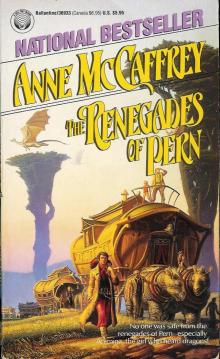 The Renegades of Pern (dragon riders of pern)
The Renegades of Pern (dragon riders of pern)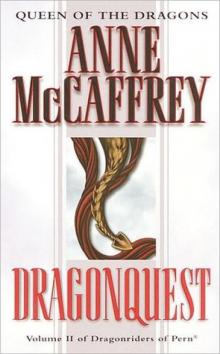 Dragonquest
Dragonquest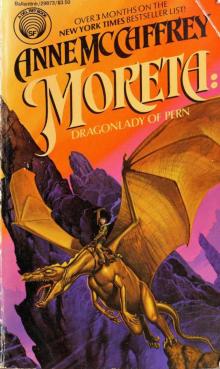 Moreta (Dragonlady of Pern)
Moreta (Dragonlady of Pern)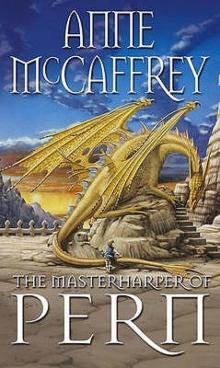 The Masterharper of Pern
The Masterharper of Pern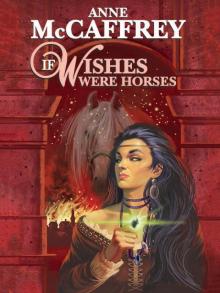 If Wishes Were Horses
If Wishes Were Horses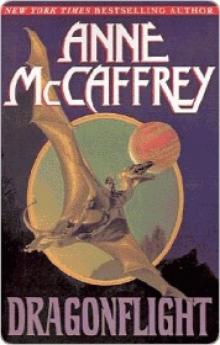 Dragonflight
Dragonflight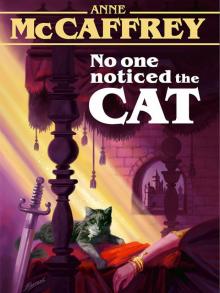 No One Noticed the Cat
No One Noticed the Cat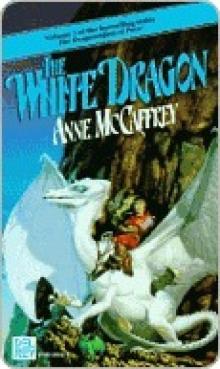 The White Dragon
The White Dragon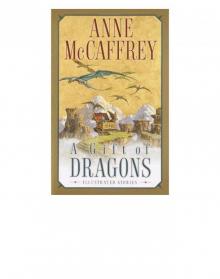 A Gift of Dragons
A Gift of Dragons Harper Hall - Dragonsong
Harper Hall - Dragonsong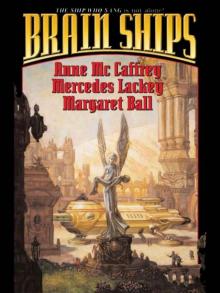 Brain Ships
Brain Ships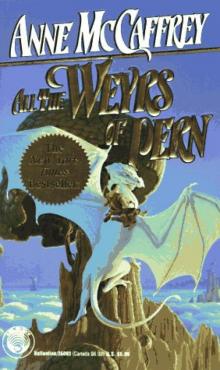 All The Weyrs of Pern
All The Weyrs of Pern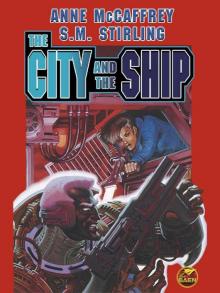 The City and the Ship
The City and the Ship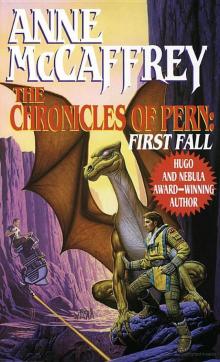 The Chronicles of Pern: First Fall
The Chronicles of Pern: First Fall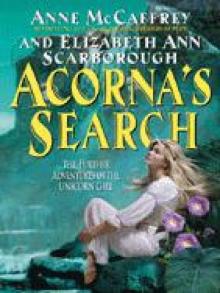 Acorna’s Search
Acorna’s Search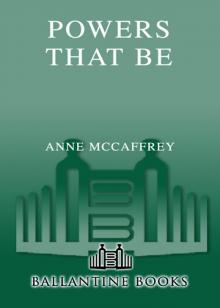 Powers That Be
Powers That Be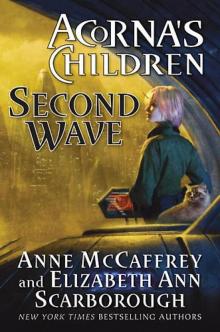 Second Wave
Second Wave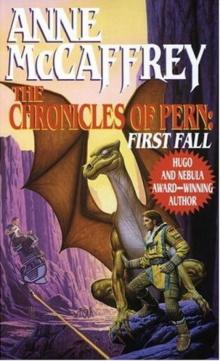 Chronicles of Pern (First Fall)
Chronicles of Pern (First Fall)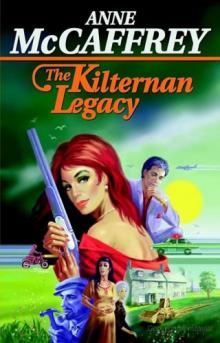 The Kilternan Legacy
The Kilternan Legacy Decision at Doona
Decision at Doona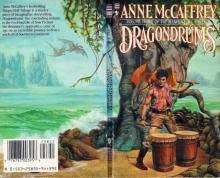 Dragondrums (dragon riders of pern)
Dragondrums (dragon riders of pern)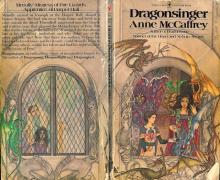 Dragonsinger (dragon riders of pern)
Dragonsinger (dragon riders of pern)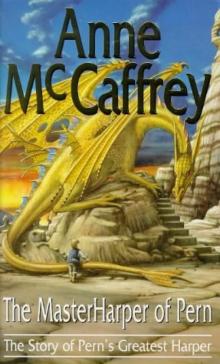 The Master Harper of Pern
The Master Harper of Pern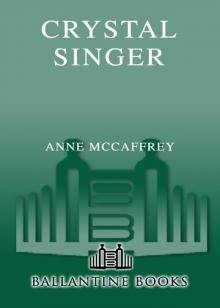 Crystal Singer
Crystal Singer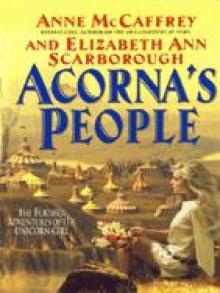 Acorna’s People
Acorna’s People Pegasus in Flight
Pegasus in Flight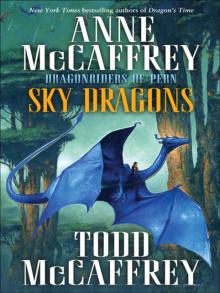 Sky Dragons Dragonriders of Pern
Sky Dragons Dragonriders of Pern Dragonriders of Pern 4 - Dragonsinger
Dragonriders of Pern 4 - Dragonsinger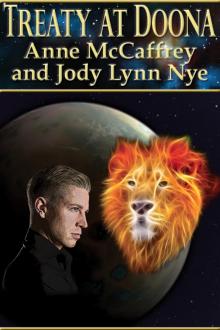 Treaty at Doona
Treaty at Doona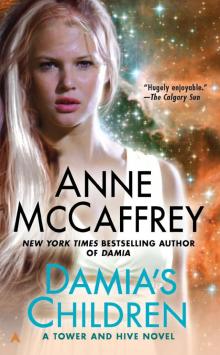 Damia's Children
Damia's Children Stitch In Snow
Stitch In Snow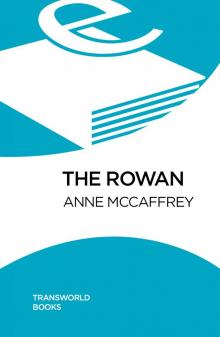 The Rowan
The Rowan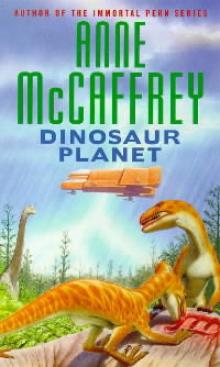 Dinosaur Planet
Dinosaur Planet The Year of the Lucy
The Year of the Lucy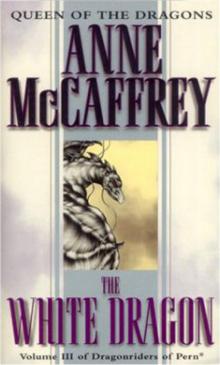 The White Dragon p-4
The White Dragon p-4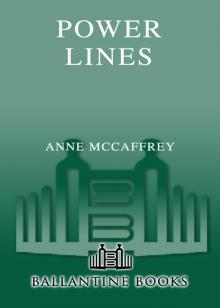 Power Lines
Power Lines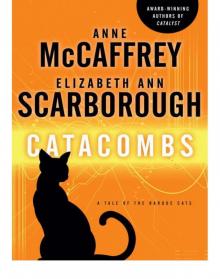 Catacombs
Catacombs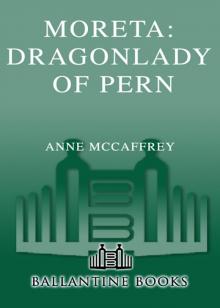 Moreta
Moreta Dragonsinger
Dragonsinger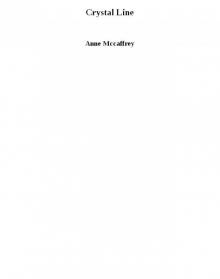 Crystal Line
Crystal Line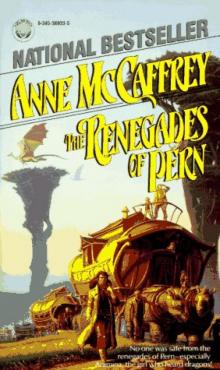 The Renegades of Pern
The Renegades of Pern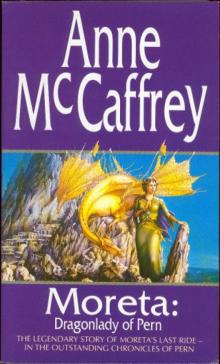 Moreta - Dragonlady of Pern p-8
Moreta - Dragonlady of Pern p-8 Deluge
Deluge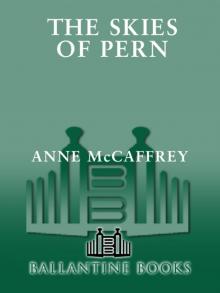 The Skies of Pern
The Skies of Pern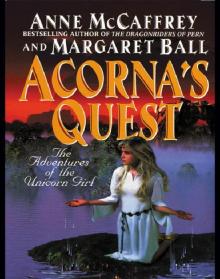 Acorna's Quest
Acorna's Quest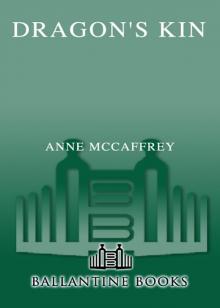 Dragon's Kin
Dragon's Kin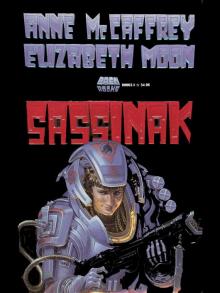 Sassinak
Sassinak![Crystal Universe - [Crystal Singer 03] - Crystal Line Read online](http://i1.bookreadfree.com/i1/03/31/crystal_universe_-_crystal_singer_03_-_crystal_line_preview.jpg) Crystal Universe - [Crystal Singer 03] - Crystal Line
Crystal Universe - [Crystal Singer 03] - Crystal Line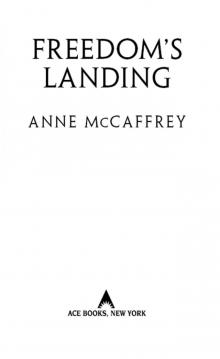 Freedom's Landing
Freedom's Landing Acorna’s Quest
Acorna’s Quest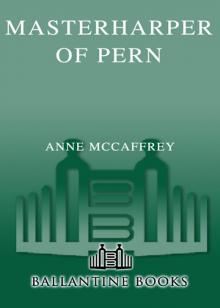 Masterharper of Pern
Masterharper of Pern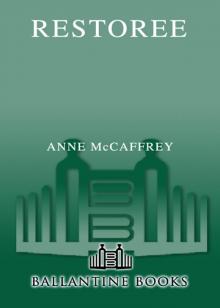 Restoree
Restoree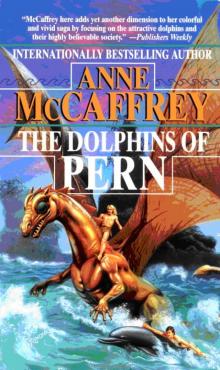 Dolphins of Pern
Dolphins of Pern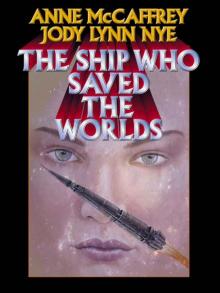 The Ship Who Saved the Worlds
The Ship Who Saved the Worlds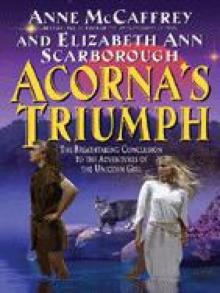 Acorna's Triumph
Acorna's Triumph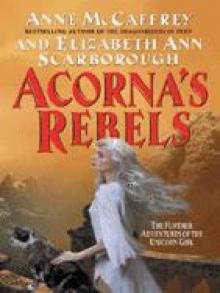 Acorna's Rebels
Acorna's Rebels![[Acorna 08] - First Warning: Acorna's Children (with Elizabeth Ann Scarborough) Read online](http://i1.bookreadfree.com/i1/04/06/acorna_08_-_first_warning_acornas_children_with_elizabeth_ann_scarborough_preview.jpg) [Acorna 08] - First Warning: Acorna's Children (with Elizabeth Ann Scarborough)
[Acorna 08] - First Warning: Acorna's Children (with Elizabeth Ann Scarborough)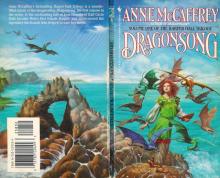 Dragonsong (dragon riders of pern)
Dragonsong (dragon riders of pern) Dragonriders of Pern 6 - Dragondrums
Dragonriders of Pern 6 - Dragondrums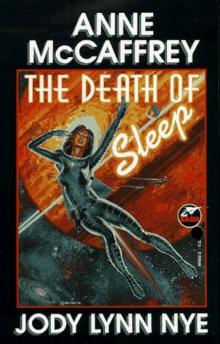 The Death of Sleep
The Death of Sleep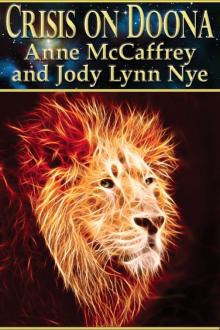 Crisis On Doona
Crisis On Doona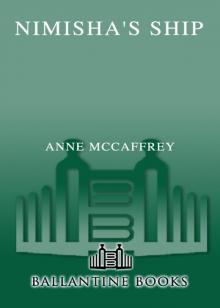 Nimisha's Ship
Nimisha's Ship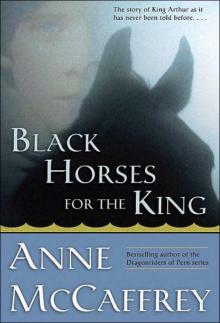 Black Horses for the King
Black Horses for the King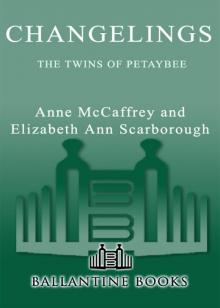 Changelings
Changelings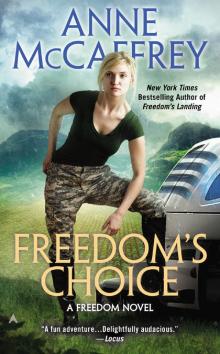 Freedom's Choice
Freedom's Choice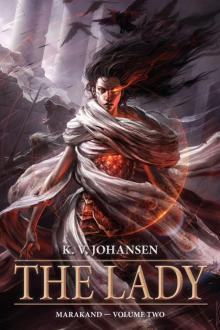 The Lady
The Lady The Coelura
The Coelura Catalyst
Catalyst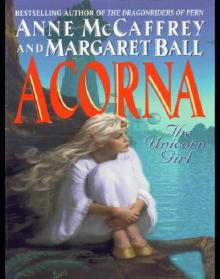 The Unicorn Girl
The Unicorn Girl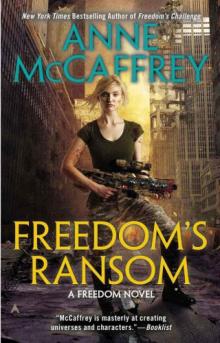 Freedom's Ransom
Freedom's Ransom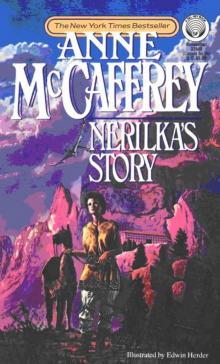 Nerilka's Story
Nerilka's Story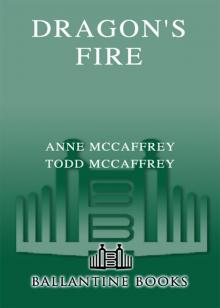 Dragon's Fire
Dragon's Fire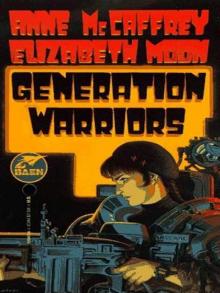 Generation Warriors
Generation Warriors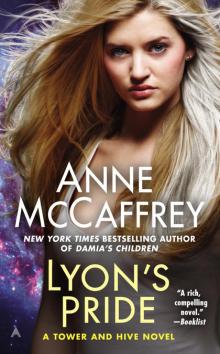 Lyon's Pride
Lyon's Pride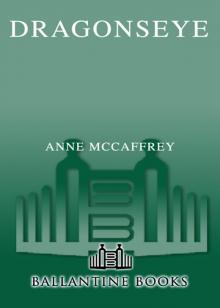 Dragonseye
Dragonseye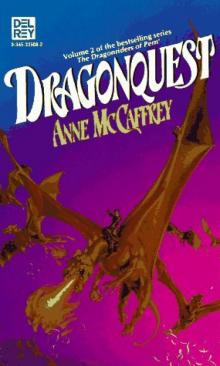 Dragon Quest
Dragon Quest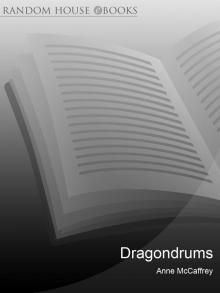 Dragondrums
Dragondrums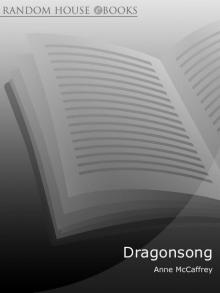 Dragonsong
Dragonsong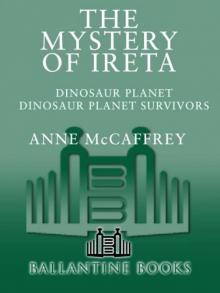 The Mystery of Ireta
The Mystery of Ireta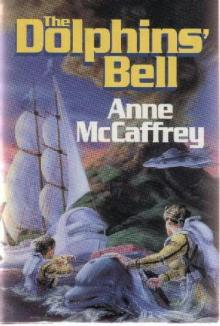 Dolphins' Bell
Dolphins' Bell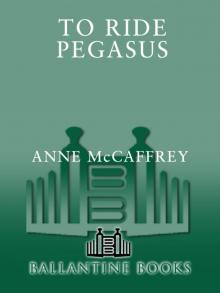 To Ride Pegasus
To Ride Pegasus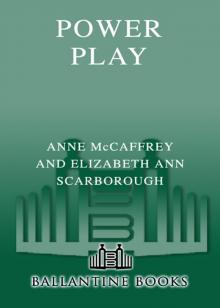 Power Play
Power Play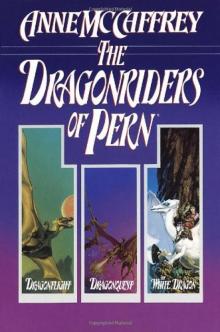 The Dragonriders of Pern
The Dragonriders of Pern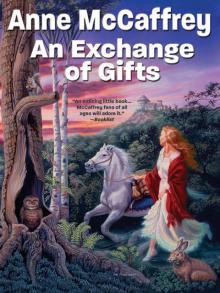 An Exchange of Gifts
An Exchange of Gifts The Ship Who Sang
The Ship Who Sang Sky Dragons: Dragonriders of Pern
Sky Dragons: Dragonriders of Pern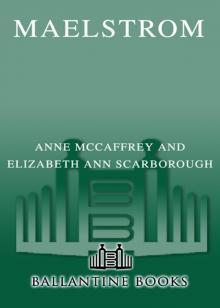 Maelstrom
Maelstrom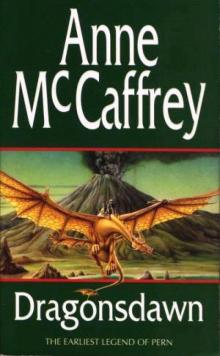 Dragons Dawn
Dragons Dawn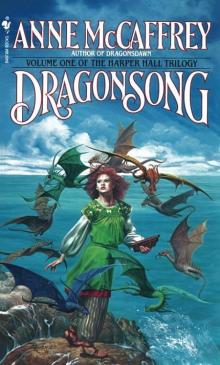 Dragon Song
Dragon Song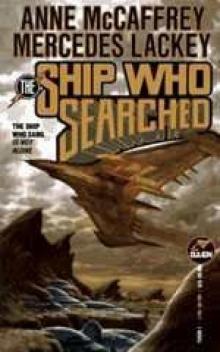 The Ship Who Searched b-3
The Ship Who Searched b-3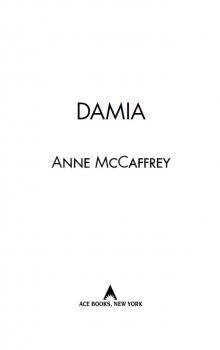 Damia
Damia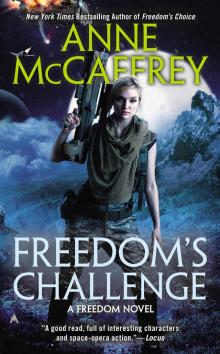 Freedom's Challenge
Freedom's Challenge